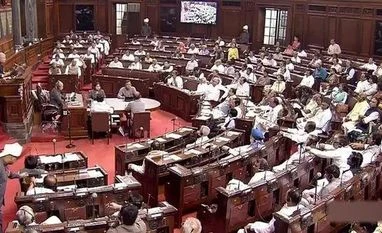The Rajya Sabha on Tuesday passed the Indian Institutes of Management (Amendment) Bill, 2023 to amend the Indian Institutes of Management Act, 2017.
The Bill was passed by the Lok Sabha on August 4. It will now be presented to President Droupadi Murmu before it becomes an Act.
The Bill comes six years after the IIM Act, 2017, which declared the 20 IIMs across the country to be "institutions of national importance" and conferred them greater autonomy in administration and academic functioning.
However, the Centre's stance has now shifted. It has proposed a draft bill to amend the 2017 Act, aiming to curtail the autonomy previously enjoyed by these prominent B-schools.
Interestingly, before 2017, the government was responsible for appointing directors, chairpersons and board members to the IIMs.
What the draft bill proposes?
More From This Section
The draft bill, which was introduced by Union education minister Dharmendra Pradhan in the Parliament's ongoing monsoon session, aims to appoint the President of India as the "Visitor" to the IIMs.
According to the draft bill, the Visitor will have powers to conduct an audit of their functioning, order inquiries, and appoint or dismiss its chairpersons of the board of governors and directors.
"The Visitor may appoint one or more persons to review the work and progress of any institute and to hold inquiries into the affairs thereof and to report thereon in such manner as the Visitor may direct," the draft bill stated.
Additionally, the draft bill suggests that the search-cum-selection panel for the director's appointment include a Visitor's nomination.
"…the services of the director may be terminated by the Visitor, in such a manner as may be prescribed," the draft said.
The Visitor can also appoint the chairperson of the coordinating forums of each IIM. These forums are established to facilitate coordination among all institutes in order to attain common policy objectives.
In India, the President is the Visitor to all central universities and IITs. He/she is empowered to appoint its vice-chancellors and directors as well.
What are the existing rules under IIM Act, 2017?
IIMs have more autonomy to be administered by their board of governors, with each institute having 19 members, including only one representative from central and state governments.
The board has the authority to make policy decisions on the administration and working of the institutes. The board of governors elects its chairperson. Members could include eminent persons from education, science, industry, technology and management, among others.
The board of governors serves as the paramount decision-making body for each IIM, with the power to appoint search-cum-selection panels for appointments of new directors and decide their pay (according to rules laid down by the Centre). Additionally, the board is responsible for creating posts, establishing departments, approving annual budgets and determining fees.
Scenario prior to the 2017 Act
Before 2017, the Centre appointed the chairpersons to the board of governors and the directors for each IIM, much as it did for IITs and AIIMS.
Moreover, until 2017, the IIMS would only grant diplomas for postgraduate courses and not degrees. The IIM Act gave the institutions degree-granting power.
What is the tussle between Centre and IIMs?
The top management schools ran into conflict with the Centre over awarding one-year executive MBA degrees in early 2020 as the latter red-flagged the granting of such a degree, citing the University Grants Commission (UGC) rules, according to which there is no provision to grant a degree for a course length of a year.
Following this, multiple meetings were conducted between the IIM heads and the government to discuss the subject. Still, the institutes continued to grant one-year degrees despite the government's reservations on the same. It is usually foreign universities following the '4+1' education model whereupon a four-year undergraduate course, and a one-year Master's degree is offered for many programmes.
Another instance where the two disagreed was last year when IIM-Rohtak reappointed its director for the second time, despite a debate over the official's academic credentials and opposition from the education ministry.
Last year, the education ministry alerted the institutes about a new method being worked out to form search-cum-selection committees to appoint chairpersons. The board of governors of the institutes were asked to prolong the existing chairpersons' terms until the new procedure takes effect. This, however, did not sit well with the administration of the IIMs, with several board members denouncing it as "interference" in their matters.
What do faculty members have to say?
Faculty members have expressed concerns about the possible dilution of the autonomy of the IIMs under the proposed Bill while simultaneously stating that the institutes must remain accountable to public scrutiny without infringing on their freedom.
Furthermore, while the first-generation IIMs, like those in Ahmedabad, Calcutta, Bangalore, and Indore, among others, have been self-sustaining, the other newer IIMs are still heavily reliant on government financing to run.
According to Professor Trilochan Sastry of IIM-Bangalore, the draft bill proposes that the chairperson and director of the institutes be appointed by the government, as was previously the case.
"However, I do feel that if we have to go global, we must look at the best practices being followed by the top universities internationally. Be it Cambridge, Oxford or Berkeley, all these universities, though being partially or in some way funded by the government, still exercise a greater degree of autonomy," Sastry was quoted as saying.
"They have maintained their standards of excellence over centuries due to a host of factors, of which having a great degree of autonomy to run the institutions has been the most important. We can, of course, improve on these best practices," he added.
)